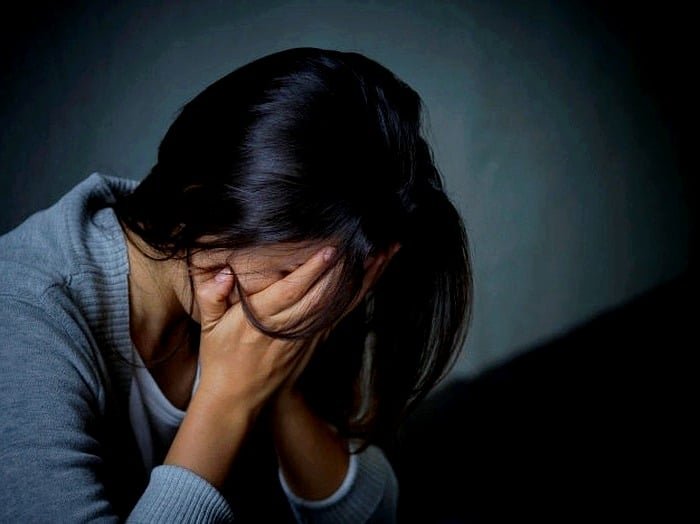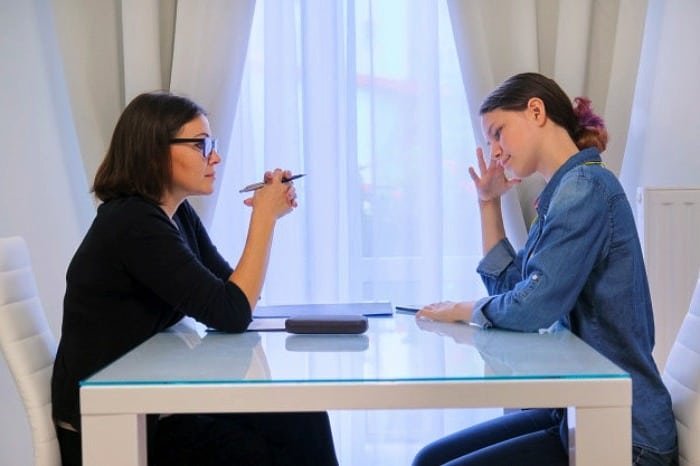Dealing properly with mental problems after divorce and coping with separation.
Separation or divorce can be one of the most emotional and stressful experiences in life.StressThe reason for separation can turn your world upside down, triggering all kinds of painful feelings. The grief from losing your relationship may come with confusion, isolation, and fear of the future, but there are many ways to cope with this pain as we will explain in this section of SelMagz.SelMagzThere are many things you can do to deal with that pain, get through this tough time, and move forward with a new sense of hope and optimism.

What should you do to address mental issues after divorce?
Why is separation so painful?
Even when a relationship isn’t good, divorce can still be very painful as it represents a loss, not just of the relationship but also of the dreams and commitments you shared. Romantic relationships begin with excitement and hopes for the future, and when one fails, we experience deep disappointment, stress, and grief; separation or divorce takes you into an unknown territory.
Everything falls apart: your routines, responsibilities, home, relationships with family and friends, and even your identity. Separation also brings uncertainty about the future.
What will life be like after divorce without your partner?
Will you find someone else? Will you be alone? These unknowns often feel worse than being in an unhappy relationship. This pain, along with chaos and uncertainty, can make recovery after separation or divorce difficult and time-consuming. However, it’s important to remind yourself that you can cope with this challenging experience and rebuild your life as a stronger and wiser individual.

Mental damages after divorce
Coping with separation or divorce:
Know that it’s okay to have different feelings. It’s natural to feel sadness,anger, frustration, and confusion; these feelings can be intense. You may also worry about the future. Accept these reactions as they tend to lessen over time. Even if the relationship was unhealthy, daring to step into the unknown can be frightening, but if you find yourself in the post-divorce phase, keep reading this section of SelMagz to cope with the mental challenges of this tough phase.
Give yourself a break:
Allow yourself to rest and work less than usual. You might not be able to be as productive at your job or pay attention to others. No one is Superman; healing and renewing yourself takes time.
Don’t be alone:
Sharing your feelings with friends and family can help you through this period. Consider joining a support group where you can connect with others in similar situations. Remaining alone and isolated can elevate your stress levels, reduce your focus, and negatively impact your work, relationships, and overall health.

Sharing your feelings with friends
Allow yourself to mourn your separation:
Mourning is a natural reaction to loss, and separation or divorce from a romantic relationship involves multiple losses, including companionship and shared experiences (which may have been constantly enjoyable).
Lack of financial, rational, social, and emotional support:
Lack of hope, plans, and dreams (which can sometimes be more painful than practical losses).
Allow yourself to feel the pain of these losses, which can be intimidating:
You might fear that your feelings alone might be too intense or that you’ll be stuck in a dark place forever. Just remember that grieving is essential to the healing process. The pain and sorrow are exactly what help you let go of your old relationship and move on, and no matter how much sorrow you feel, it won’t last forever.

The fear of the future after divorce
Tips for mourning after separation or divorce:
Don’t fight your feelings; it’s normal to experience many ups and downs, and conflicting emotions such as anger, sadness, relief, fear, and confusion. Recognizing and acknowledging these feelings is crucial. While these feelings will often be painful, attempting to suppress or ignore them only prolongs the grieving process.
Talk about how you feel:
Even if you find it hard to discuss your feelings with others, finding a way to do so during your grieving period is very important. Knowing that others are aware of your feelings can prevent you from feeling lonely in your pain and helps you heal.
Remember that moving toward a goal is important:
Expressing your feelings will free you in some way, but it’s essential not to rely too heavily onnegative feelingsor overanalyze the situation. Being stuck in harmful emotions like blame, anger, and rage drains your valuable energy and hinders healing and moving forward.

Expressing feelings and solving mental issues after divorce
Remind yourself that you still have a future:
When you commit to another person, you create many hopes for a shared life. After a breakup, letting go of those hopes can be hard. As you struggle with losing the future you once envisioned, let the reality encourage you that new hopes and dreams will eventually replace your old familiar ones.
The difference between a natural reaction to separation anddepression
Feeling sad after a breakup can be debilitating, but after some time, the sadness fades. Little by little, you start to move on. But if you don’t feel any forward movement, you may be suffering from depression.
If you want to reach out for help:
If connecting with others is not impactful, consider seeing a counselor or joining a support group. The most important thing is to have at least one space where you feel comfortable.

Treating depression after divorce with professional help
Support from others:
Receiving support from others is crucial for healing after separation or divorce. You may feel lonely, but isolating yourself will only make this time harder. Don’t try to go through this alone.
Spend your time with people who support you, value you, and energize you:
Choose wisely whom you spend time with. Seek out positive people who truly listen to you. It’s important to feel free to express yourself without fear of judgment, criticism, or direction.
Connect face-to-face with friends and family:
People who have experienced painful separation or divorce can be incredibly helpful. They know what it’s like, and friends can assure you that there is hope for recovery and new relationships. Regular face-to-face interaction is a great way to ease the tension of a breakup and restore balance in your life.

Connecting with friends after divorce to lift your spirits
Making new friendships:
If you feel the need for a networking group or special interest club, go to a class, participate in social activities, or volunteer at school, your place of worship, or other community organizations.
Take care of yourself after separation:
Divorce is a very stressful and changing event. When experiencing it and dealing with significant life changes, you need to pay more attention to yourself. The stress and pain from a breakup can leave you vulnerable emotionally and physically.
Treat yourself as if you have a cold:
Get plenty of rest, minimize other stressors in your life, and reduce your workload if possible. Learning self-care can be one of the most valuable lessons after a breakup.

Reducing stress related to separation
Self-care tips after divorce
Make time every day to nurture yourself:
Create a daily schedule to include relaxing activities that help you heal. Spend time with good friends, seek nature walks, listen to music, enjoy a hot bath,get a massageattend a classgo to yoga, or savor a cupof hot coffee.Pay attention to what you need in each moment and express your needs:Respecting what you think is right is better, even if it differs from what others want. Say no without guilt or fear.
Maintain your routines:
Separation can lead to disorder, increased stress, uncertainty, and chaos in life. Returning to daily routines can create a sense of comfort and calm.
Handling daily tasks after divorce
Take time off:

Avoid making significant decisions in the months following separation or divorce, like starting a new job or moving to a new city, if possible. It’s best to wait until you feel less bad before making decisions.
Avoid using drugs, alcohol, or
food
as coping mechanisms:When in the midst of a breakup, you may be tempted to do anything to ease your feelings of pain and loneliness. However, using drugs or food as an escape can be harmful in the long run. Finding healthy ways to cope with painful emotions is essential; an emotional toolkit can help with that.Exploring new interests:
Separation or divorce is both a beginning and an end. Take this opportunity to discover new interests and activities. Engaging in new hobbies gives you a chance to enjoy life in the moment rather than dwelling on the past.
Discovering and engaging in new activities after separation
Choosing healthy options:

Eat well, sleep well, and exercise. When suffering from the stress of divorce or separation, healthy habits can easily fall by the wayside. You may overeat or skip your favorite foods. Exercising may feel harder due to added stress, and sleep can seem unattainable. But all that matters is making choices that promote healthy living. Check out:
healthy nutrition
, how to sleep better, and how to start and stick with exercising.Learning important lessons from separation or divorce:When going through a painful breakup, it can be hard to see, but there are opportunities for growth and learning during emotional crises. You may feel nothing but emptiness and sadness in your life, but that doesn’t mean things will never change. Try to view this time in your life as a chance to plant seeds for new growth. You can emerge from this experience knowing yourself better and feeling stronger and wiser.
To fully accept a separation and move on, you need to acknowledge what happened and validate the role you played. The more you comprehend, the better your choices will be in the next relationship. Learn from your mistakes and avoid repeating them in the future.
Methods for achieving peace after divorce
Ask yourself questions:

Step back and look at the bigger picture. How did you contribute to the problems in this relationship?
Do you want to repeat the same mistakes or choose the wrong person in a relationship after separation?
Think about how you react to stress and cope with challenges. Can you respond in a more constructive way?
Consider whether you accept others as they are, not as you wish them to be.
Examine your negative feelings as a starting point for change. Are you in control of your emotions or are your emotions in control of you?
During this healing process, you must be honest with yourself. Try not to assign blame or criticize yourself for your mistakes. Looking back at your relationship offers an opportunity to learn more about yourself, how you relate to others, and what issues you need to work on. If you can objectively assess your choices and actions, you might see why you chose your ex-partner and how to make better choices next time.
After divorce
Post-divorce issues







